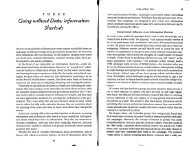The Third-Person Effect in Communication W. Phillips Davison The ...
The Third-Person Effect in Communication W. Phillips Davison The ...
The Third-Person Effect in Communication W. Phillips Davison The ...
Create successful ePaper yourself
Turn your PDF publications into a flip-book with our unique Google optimized e-Paper software.
10 W. PHILLIPS DAVISON<br />
change the attitudes of many people toward Hughes; they rather<br />
changed expectations about the support he would receive from<br />
others. Individuals may have reasoned: "I am go<strong>in</strong>g to vote for him<br />
because the newspapers have probably conv<strong>in</strong>ced other people of<br />
someth<strong>in</strong>g I already know-namely, that he is the best candidate-<br />
and therefore he has a good chance of w<strong>in</strong>n<strong>in</strong>g."<br />
Such an <strong>in</strong>terpretation was given by the campaign manager of<br />
former mayor Carl Stokes of Cleveland, who mentioned at a Colum-<br />
bia University sem<strong>in</strong>ar on public communication that the endorse-<br />
ment by the Cleveland Pla<strong>in</strong> Dealer was one of the major reasons for<br />
Stokes' victory <strong>in</strong> the 1967 mayoralty race.<br />
"Do you th<strong>in</strong>k the Pla<strong>in</strong> Dealer's support really changed many<br />
people's op<strong>in</strong>ions," he was asked.<br />
"I don't th<strong>in</strong>k it changed any," was the reply. "But it conv<strong>in</strong>ced<br />
some <strong>in</strong>dividuals and organizations that he had a chance; so they<br />
started send<strong>in</strong>g <strong>in</strong> campaign contributions."<br />
A similar observation about campaign contributions was made by<br />
the press secretary of Senator Fred Harris, who ran for the Demo-<br />
cratic nom<strong>in</strong>ation <strong>in</strong> the primaries prior to the 1976 presidential elec-<br />
tion:<br />
But <strong>in</strong> order to raise that k<strong>in</strong>d of money dispersed among twenty states, then<br />
you need national media exposure. You need it because people do judge by<br />
national media exposure as to whether the campaign is serious or not and,<br />
believe me, they hesitate before they give money. . . . <strong>The</strong>y're go<strong>in</strong>g to Wait<br />
until they see Fred's smil<strong>in</strong>g face on national television (quoted <strong>in</strong> Arterton,<br />
1978:9).<br />
It is probable that advertisers and marketers are aware of the<br />
action-<strong>in</strong>duc<strong>in</strong>g potential of the third-person effect, although I have<br />
not noted references to this <strong>in</strong> the research literature. <strong>The</strong> frequently<br />
used appeal, "Buy yours while the supply lasts," certa<strong>in</strong>ly suggests<br />
that others will be persuaded by the advertis<strong>in</strong>g and that one had<br />
therefore better make a purchase promptly.<br />
Relationships to Other Phenomena<br />
Media bias is frequently perceived <strong>in</strong> situations where it is clearly<br />
absent or where it is present to a very limited extent. For example, <strong>in</strong><br />
the 1972 presidential campaign, many of those who preferred<br />
McGovern thought their newspaper was giv<strong>in</strong>g more attention to<br />
Nixon; and many who were for Nixon thought McGovern was receiv<strong>in</strong>g<br />
more exposure <strong>in</strong> the same medium. <strong>The</strong> same judgments<br />
were made with regard to television news, although less frequently.<br />
Yet analysis of the media <strong>in</strong> question showed that they were giv<strong>in</strong>g











